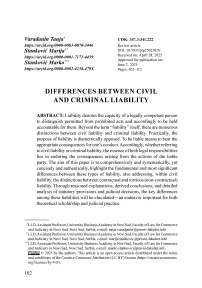Differences between civil and criminal liability
Автор: Marko Stanković, Tanja Varađanin, Marija Stanković
Журнал: Pravo - teorija i praksa @pravni-fakultet
Рубрика: Articles
Статья в выпуске: 2 vol.42, 2025 года.
Бесплатный доступ
Liability denotes the capacity of a legally competent person to distinguish permitted from prohibited acts and accordingly to be held accountable for them. Beyond the term “liability” itself, there are numerous distinctions between civil liability and criminal liability. Practically, the purpose of liability is diametrically opposed. To be liable means to bear the appropriate consequences for one’s conduct. Accordingly, whether referring to civil liability or criminal liability, the essence of both legal responsibilities lies in enduring the consequences arising from the actions of the liable party. The aim of this paper is to comprehensively and systematically, yet concisely and authentically, highlight the fundamental and most significant differences between these types of liability, also addressing, within civil liability, the distinctions between contractual and tortious (non-contractual) liability. Through reasoned explanations, derived conclusions, and detailed analysis of statutory provisions and judicial decisions, the key differences among these liabilities will be elucidated—an endeavor important for both theoretical scholarship and judicial practice.
Civil liability, criminal liability, contractual liability, non-contractual liability
Короткий адрес: https://sciup.org/170209490
IDR: 170209490 | УДК: 347.3:341.222 | DOI: 10.5937/ptp2502102V


